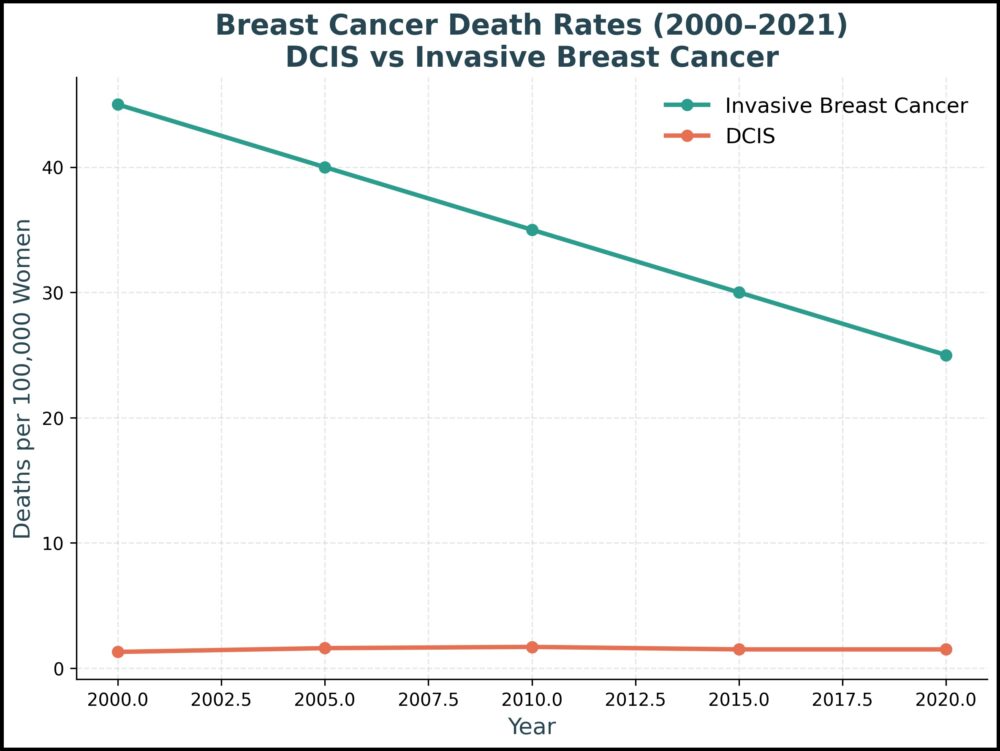News & Updates
- February 4, 2026

Is Tamoxifen Alone Without Surgery a Viable Strategy for Low-Risk DCIS?: Updates From the LORETTA Trial
In December 2025, results from the LORETTA trial were presented at the San Antonio Breast Cancer Symposium (SABCS), offering new insight into an important and long-standing question in DCIS care: Can some people with low-risk DCIS safely avoid surgery?
While the trial did not meet its predefined statistical threshold, the findings add meaningful evidence to the growing body of research suggesting that active surveillance may be appropriate for carefully selected patients. Importantly, the results help clarify who those patients might be.
- January 10, 2026

New DCIS Radiation Findings Presented at SABCS: What High-Risk Patients Should Know
At the San Antonio Breast Cancer Symposium (SABCS) in December, researchers presented updated results from a large international clinical trial examining radiation treatment after surgery for ductal carcinoma in situ (DCIS). The study offers important insights into how radiation can reduce the chance of DCIS returning in the same breast — particularly for people considered at higher risk of recurrence.
- December 19, 2025

Reflections from the 2025 San Antonio Breast Cancer Symposium
Last week, DCIS Understood had the opportunity to attend the San Antonio Breast Cancer Symposium (SABCS) — one of the world’s most important gatherings dedicated to breast cancer research and care. We returned feeling energized, inspired, and deeply grateful to be part of a global community working toward better outcomes and more thoughtful, patient-centered care.
- November 13, 2025

Can Biopsy Alone Help Identify Which DCIS Is Truly “Low Risk”?
For many women diagnosed with DCIS, one of the toughest questions is whether surgery is truly necessary — especially if the DCIS looks low-risk. The idea of active monitoring (close follow-up with imaging and exams, without immediate surgery) is gaining attention in clinical trials. But one challenge remains: how can doctors be sure a biopsy really shows the whole truth about the DCIS?
- October 21, 2025

🩷 Updates & Insights from DCIS Understood | October 2025
Read our October 2025 newsletter!
- October 20, 2025

Polygenic Risk Score May Help Personalize Risk Prediction for DCIS and LCIS
When someone is diagnosed with ductal carcinoma in situ (DCIS) or lobular carcinoma in situ (LCIS), one of the toughest questions is: What happens next? Not all in situ lesions progress to invasive cancer, yet many people feel pressure to treat aggressively for fear of missing something.
A new study from the American Association for Cancer Research suggests a promising—but still tentative—tool: a polygenic risk score (PRS), a number based on hundreds of inherited genetic variants. This approach may someday help personalize risk predictions for future breast events after an in situ diagnosis.
- October 14, 2025

Are Death Rates from Breast Cancer After Initial DCIS Diagnosis Going Down? A New Study Raises Questions
When we talk about progress in breast cancer, we often point to the encouraging news that deaths from invasive breast cancer have steadily declined over recent decades—thanks to advances in detection, treatment and care.
But for DCIS, there is weak or even no evidence that our current treatments actually reduce the chance of dying from breast cancer. A new study published in Breast Cancer Research looked closely at this question, and the results raise important concerns.
- October 2, 2025

Share Your Voice: New Clinical Trial Survey on Active Monitoring for DCIS
Here is an important opportunity to have your voice and preferences heard!
The COMET Study team has asked for DCIS Understood’s help with outreach about a new potential clinical trial utilizing active monitoring for low-risk DCIS. You can participate in this short survey even if your DCIS was high-grade. Your honest opinions are greatly appreciated!
- September 29, 2025

A New Clue to Why Some DCIS Becomes Invasive Cancer
One of the biggest questions for people diagnosed with DCIS is: which cases will stay harmless inside the milk ducts, and which ones will progress to invasive breast cancer?
A new study from researchers in Finland and Sweden offers an important piece of this puzzle. They discovered that a protein called HSF2 may act like a “switch” that helps determine whether cells stay put in the ducts or begin invading surrounding breast tissue.
- September 3, 2025

Dutch Study Brings Reassuring News About Long-Term Outcomes for DCIS Patients
A new study from the Netherlands offers encouraging news for women diagnosed with ductal carcinoma in situ (DCIS). Researchers followed nearly 19,000 women diagnosed between 1999 and 2015 and looked at how many went on to die of breast cancer over the next decade. The results may surprise you: only about 1.3% of women died from breast cancer within ten years of their DCIS diagnosis. This suggests that, while DCIS carries some risk, the vast majority of women will not die of breast cancer in the decade following their diagnosis. The study also compared women with DCIS to the general population….
- August 15, 2025

Your Voice Matters: Protect Access to Genomic Testing for DCIS Patients
Every year, 60,000 women in the U.S. are diagnosed with ductal carcinoma in situ (DCIS), considered the earliest non-invasive form of breast cancer. Many women with DCIS receive radiation therapy (RT) after surgery—but not all of them need it.
Genomic tests like DCISionRT help personalize care by providing biological insights that help patients and their doctors understand whether radiation therapy is likely to benefit them. With this information, women can make more informed decisions and potentially avoid unnecessary treatment and side effects.
- July 24, 2025

🩷Welcome to DCIS Understood: Your Guide, Community & Advocate | July 2025
Read our inaugural newsletter!
- July 22, 2025

Why Slowing Down Matters: A Candid Conversation About DCIS Decisions
In this heartfelt interview, long-time DCIS patient advocate Donna Pinto speaks with Janet Gola, who speaks candidly about her nearly 26-year journey with DCIS—from her initial 1999 diagnosis through a second struggle in 2012, nine procedures, and a mastectomy that left her with PTSD. Janet shares critical wisdom for newly diagnosed patients, emphasizing the importance of slowing down, asking questions, and understanding your pathology report.
- July 18, 2025

Is It Safe to Wait? What a New Study Says About Delaying Surgery for DCIS
When you’re told you have ductal carcinoma in situ (DCIS), the instinct is often to treat it quickly and aggressively. But what if some DCIS doesn’t need immediate surgery at all? A new study published in The BMJ (British Medical Journal) suggests that for some women, waiting and watching may be a safe option. In this observational cohort study, researchers followed 1,780 women across the U.S. who were diagnosed with DCIS but chose not to have surgery within the first six months of diagnosis. The goal was to understand how many later developed invasive breast cancer and how many died from breast…
- July 10, 2025

Endocrine Therapy for 2+ Years May Be as Effective as Radiation for Some DCIS Patients
Ductal carcinoma in situ (DCIS) is often found through screening before it has a chance to spread. While this sounds reassuring, it leads to a tough question: how much treatment is enough? Most DCIS patients undergo surgery, often followed by radiation and/or hormone (endocrine) therapy. But not all DCIS is aggressive, and over-treating low-risk cases can cause unnecessary side effects. This new study, published in NPJ Breast Cancer, takes a fresh look at how long endocrine therapy needs to be taken—and whether it might offer similar protection as radiation. Researchers analyzed 1,916 patients from two large California cancer centers, with a…
- June 18, 2025

From Navigating the Unknown to Building a Movement: My DCIS Journey
The bad news is you have ductal carcinoma in situ. The good news is that DCIS is the best type of breast cancer to get. Those were the words of the pathologist delivering my biopsy results.
- June 11, 2025

Could a Menopause Drug Help Prevent Invasive Breast Cancer? A New Study Offers Hope for DCIS Patients
A recent Phase 2 clinical trial led by Northwestern Medicine suggests that Duavee, a medication already FDA-approved to treat menopause symptoms, might also help prevent invasive breast cancer in some women diagnosed with ductal carcinoma in situ (DCIS). The study, led by Dr. Swati Kulkarni, a breast surgeon and professor at Northwestern University Feinberg School of Medicine, was presented on June 1 at the American Society of Clinical Oncology (ASCO) Annual Meeting in Chicago. What Was the Study About? The trial included 141 postmenopausal women with estrogen receptor-positive (ER+) DCIS, a type of early-stage breast condition that may sometimes lead to invasive cancer. Participants were randomly assigned…
- June 3, 2025

Listening to Patients, Changing Protocols: Dr. Melvin Silverstein’s Legacy in DCIS Care
In this episode of the Cancer History Project podcast, Dr. Melvin Silverstein reflects on his groundbreaking work in breast cancer care—especially his role in changing how doctors treat and think about ductal carcinoma in situ (DCIS). Interviewed by Dr. Stacy Wentworth, Silverstein shares stories from his decades-long career, including founding the Van Nuys Breast Center—the first free-standing breast center in the U.S.—and challenging widely accepted norms in cancer treatment. Silverstein is best known for developing tools like the Van Nuys Prognostic Index, which helped personalize DCIS treatment at a time when all patients were typically treated the same. He believed…
- May 5, 2025

Study Finds No Clinical Benefit in Re-Excising Narrow Margins After Lumpectomy for ER+ Postmenopausal DCIS
A phase 3 clinical trial (NSABP B-35 (NCT00053898)) has found that margin widths of 1 mm vs 2 mm after lumpectomy in postmenopausal women with estrogen receptor–positive (ER+) DCIS do not result in clinically meaningful differences in rates of ipsilateral breast tumor recurrence (IBTR). The findings were presented at the American Society of Breast Surgeons conference by Dr. Irene Wapnir of Stanford Medicine. The trial included over 3,100 postmenopausal women with ER+ DCIS, all of whom received whole-breast irradiation and 5 years of hormone therapy (tamoxifen or anastrozole) after lumpectomy. Looking at 10-year rates of IBTR, the study found that rates were similar regardless of whether surgical margins…
- April 15, 2025

Personalized Care for DCIS: New Genetic Score Offers Hope
While most cases of DCIS stay harmless, some can eventually turn into invasive cancer, which is harder to treat. Right now, it’s difficult for doctors to predict which DCIS cases are likely to progress, often leading to overtreatment with surgery or radiation for many women. A new study published in Cell Death Discovery aimed to find a better way to predict which DCIS cases might turn aggressive and threaten a patient’s health. In the study, researchers looked very closely at thousands of individual breast cancer cells from patients at different stages of disease. They identified nine important genes that behave differently in invasive versus non-invasive cells. Using these…
- April 12, 2025

New Gene Test Helps Personalize Radiation and Hormone Treatment Decisions for DCIS Patients
Traditionally, doctors use physical and medical factors to decide if DCIS patients need radiation or hormone therapy following surgery. But this method is not always accurate. A study presented at the 42nd Annual Miami Breast Cancer Conference showed a 7-gene biosignature test could more accurately identify DCIS patients who would actually benefit from radiation and/or hormone therapy after breast-conserving surgery, compared to traditional clinicopathologic risk criteria. Researchers analyzed tissue samples from 926 DCIS patients. They found that women labeled “low risk” by traditional methods included a substantial number of women who, per the 7-gene test, were actually at higher risk and did benefit from radiation. Other women who were correctly…
- March 15, 2025

Why is DCIS Often Overtreated and What Can We Do About It?
There is growing concern about the overtreatment of DCIS. Overtreatment is the treating of a disease or condition even though it may not have led to symptoms in a patient’s lifetime or earlier mortality. DCIS is sometimes referred to as a “non-obligate precursor” of breast cancer. Non-obligate precursor means that it can, but often does not, lead to invasive breast cancer. Some studies estimate that as much as 50-80% of DCIS, if left untreated, would remain harmless in a patient’s lifetime. Yet even though most cases of DCIS might be able to avoid treatment, because doctors cannot reliably predict which cases those are, virtually all…
- February 28, 2025

What is Active Monitoring?
Active monitoring, also called active surveillance, is a strategy for managing low-risk DCIS in which a patient has regular imaging (including mammograms, MRIs or ultrasounds) and check-ups with her doctor. It is a strategy that avoids or delays surgery and radiation absent signs of worsening of the DCIS or invasive progression.
- February 24, 2025

Study Suggests Some DCIS Patients May Safely Avoid Surgery with Personalized Hormone Treatment
A new study published last week in Breast Cancer Research has found that certain types of DCIS may respond well to hormone therapy before surgery, and some patients might even be able to avoid surgery altogether in the future. The study explored how genomic features influence the response of estrogen receptor-positive (ER+) DCIS to pre-surgical aromatase inhibitor (AI) therapy—specifically, letrozole—in postmenopausal women. Researchers gave letrozole, a hormone-blocking pill, to postmenopausal women with ER+ DCIS for 6 months before surgery, and then looked at how the tumors changed using imaging, lab tests, and genetic analysis of the tumors. The study used genetic testing to predict which tumors would respond, helping tailor treatment to each…
- January 23, 2025

Should DCIS be Called Cancer?
Should DCIS be called cancer? It’s the million-dollar question. The answer, in short, depends on who you ask, and how they define “cancer.” The official diagnosis name is Ductal Carcinoma in Situ, and DCIS is generally referred to as “stage 0 breast cancer.” However, many physicians refer to DCIS as a “pre-cancer” or a “risk factor” for cancer, and there has been discussion over the last few decades about removing the words “carcinoma” and “cancer” from the nomenclature altogether. What’s in a Name? The language physicians use when communicating with patients matters, and the words “carcinoma” and “cancer” are loaded….
- December 28, 2024

Expanding Treatment Options for Low-Risk DCIS: First COMET Results are Released
The first results of the U.S-based Comparing an Operation to Monitoring, with or without Endocrine Therapy (COMET) trial, a phase III randomized clinical trial comparing different management strategies for low-risk DCIS, were released earlier this month. The findings were published in JAMA and JAMA Oncology and were presented at the 2024 San Antonio Breast Cancer Symposium. The key takeaway from the study is that women with low-risk DCIS who underwent active monitoring instead of surgery were no more likely to develop invasive breast cancer in the affected breast after two years. The findings represent a first step toward a safe…
- December 16, 2024

New Study Maps Molecular Clues Behind Which DCIS Cases Progress to Invasive Breast Cancer
Due to improved screening, DCIS now makes up about one-quarter of all breast cancer diagnoses. However, most cases of DCIS never progress to invasive breast cancer (IBC), meaning that many women undergo unnecessary aggressive treatments like surgery, radiation, and hormone therapy. Molecular predictors of which DCIS cases will progress remain poorly understood. To better understand which DCIS cases are likely to progress to IBC, researchers studied nearly 200 breast tissue samples from DCIS patients who either stayed healthy or later developed invasive cancer. They analyzed the samples’ genes, DNA changes, and other molecular patterns. The results were published earlier this month in Breast Cancer Research. The study concluded that DCIS…

























Subscribe below for the latest DCIS news and updates.